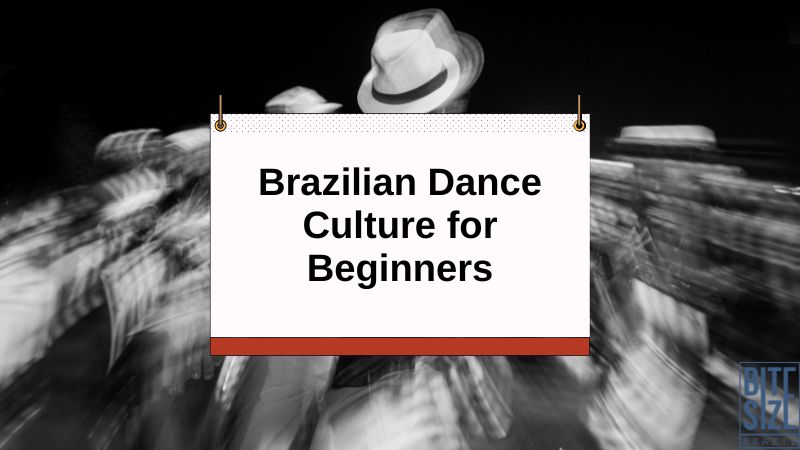Some of my students are actively involved with Brazilian music, but few know about the Brazilian dance culture.
Why?
Well, mostly because people think Brazilian samba is the only dance style we have.
And I don't blame them. After all, that's one of the most important national exports (along with other less flattering facts, such as how dangerous this country can be).
But our dance culture is much more than that. Much, much more than that.
A bit of history of our Brazilian culture
Brazilian dance culture, deeply rooted in a rich history, reflects the country's diverse influences and vibrant traditions.
The dances of Brazil are a captivating fusion of African, Portuguese, and European cultures, each contributing to the unique rhythms and movements that define the dance landscape.
The origins of Brazilian dance culture can be traced back to the African diaspora, when enslaved Africans brought their cultural traditions to Brazil. These dances served as a form of expression, resistance, and preservation of cultural identity. Over time, these African dance forms blended with the Portuguese and European influences brought by colonizers, creating a dynamic fusion of styles that is central to our culture.
As you may have seen with Carnaval (or other celebrations), dancing is pivotal to our identity. It's what connects Brazilians to their roots. It's what gives them (and me, of course, as I'm Brazilian myself) an identity.
Our national rhythms and energetic movements transcend language barriers and unite people, fostering a sense of community and shared experiences. They embody the spirit of Brazil, showcasing its rich cultural diversity and serving as a source of pride for its people.
And since I'm talking about our national rhythms, what are they then?
Samba: The Heartbeat of Brazilian Dance Culture
Samba — the heartbeat of our culture — is undoubtedly one of the country's most iconic and beloved forms of dance and music.
It embodies the spirit of joy, celebration, and unity, captivating both locals and visitors alike.
The Popularity and Prevalence of Samba
Samba holds a special place in the hearts of Brazilians and has become synonymous with the country's identity. It is mainly celebrated during the world-renowned Carnaval, an annual festival showcasing Brazil's exuberant spirit.
Samba schools compete with each other to showcase their skills and creativity in vibrant parades, an industry per se that creates several jobs for families all over the country.
Samba variations?
Samba encompasses a variety of styles and variations, each with its own distinct characteristics and regional influences.
One such style is Samba de Roda, a traditional Afro-Brazilian dance that originated in the state of Bahia [in Portuguese]. It involves circular movements, spirited footwork, and expressive gestures.
As a Brazilian, I enjoy samba de roda. But the problem is it's not so common nowadays; it's seen as something you show tourists, not something you enjoy in your daily life. Well, at least outside Rio.
Another style is the Rio-style Samba, commonly seen in the street parties and Samba schools of Rio de Janeiro. It is characterized by its fast-paced footwork, intricate body movements, and the COMPETITIONS! When I say it's an industry, I'm not exaggerating. Our carnival generates billions and billions of Brazilian reais each year.
Jongo, Capoeira, and more: our folk dances
Many of those traditions came with the enslaved Africans and remained a source of support and identity. Nowadays, they're more prevalent in some areas of the country, although many of them enjoy a good reputation abroad.
Jongo: A celebration of African heritage
Jongo is a traditional Afro-Brazilian dance that originated in the coffee plantations of Rio de Janeiro.
Its lively rhythms, energetic footwork, and call-and-response singing characterize it. Jongo is deeply rooted in African traditions and serves as a celebration of African heritage in Brazil. The dance form has faced challenges over the years, but efforts are being made to preserve and promote this cultural treasure [in Portuguese].
Capoeira: dance, martial art, and cultural expression
Capoeira is a captivating blend of dance, martial art, and music that originated among enslaved Africans in Brazil. It is characterized by its acrobatic movements, fluid kicks, and rhythmic music.
And it really soared to other countries. One of my former students — originally from Russia — teaches capoeira to people in Shanghai!
Forró: close to my heart
Forró is a popular dance form that originated in Northeastern Brazil (where I'm from) and is known for its lively music and close partner dancing. It is often associated with romance, passion, and the region's vibrant culture.
The dance is characterized by its swaying hips, quick footwork, and, well, physical closeness. Forró can be seen at dance halls, festivals, and social gatherings across Brazil.
Other Brazilian Folk Dances
In addition to Jongo, Capoeira, and Forró, Brazil is home to a myriad of other folk dances.
Carimbó, originating from the Amazon region, combines dance, music, and storytelling to portray the customs and traditions of the indigenous communities.
Lundu, a dance form influenced by African and Portuguese cultures, showcases playful movements and flirtatious interactions between dancers.
The traditional festival of Festas Juninas is another vibrant celebration that includes the Quadrilha, a lively square dance where participants dress in traditional attire and dance to lively music.
Festas Juninas allow communities to come together, honoring their traditions and celebrating the abundance of the harvest season.
Oh, and for someone from the Northeast like me, Festa Junina is as important as Carnaval is for people from Rio.
It's a mirror of our culture and society, friend
Dance is deeply intertwined with the cultural fabric of Brazil, reflecting the country's history, traditions, and diverse influences.
It is a powerful expression of Brazilian identity, capturing the essence of its people and their collective experiences. From the Afro-Brazilian rhythms of Samba to the indigenous movements of Carimbo, Brazilian dance celebrates the country's heritage. It pays homage to its multicultural roots, an essential aspect of our culture.
Brazilian dance everywhere
Brazilian dance culture has had a profound impact, not only within Brazil but also globally.
Our samba was the root of Bossa Nova, which became an internationally acclaimed music style (prevalent in cafés all over the world).
Final thoughts
One short article like this can never do justice to such a topic as the Brazilian dance culture.
It's but an introduction.
I want to show you a little bit of our culture and how it can help you understand your relationships with Brazilians.
So, whether you're a seasoned dancer or a curious traveler, I invite you to immerse yourself in the vibrant world of Brazilian dance culture. Let the rhythms move you, the dances tell their stories, and the spirit of Brazil captivate your heart.
After all, in the words of a famous Brazilian saying, "Quem não gosta de samba, bom sujeito não é" - "Whoever doesn't like Samba, is not a good person."

